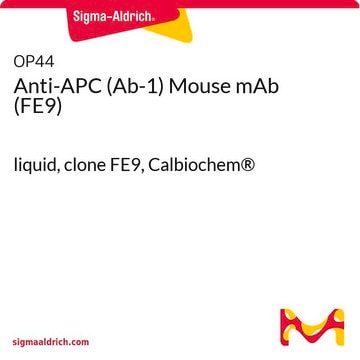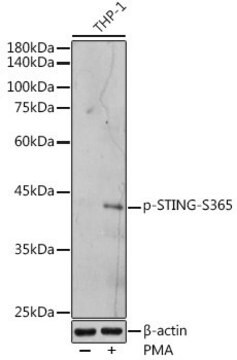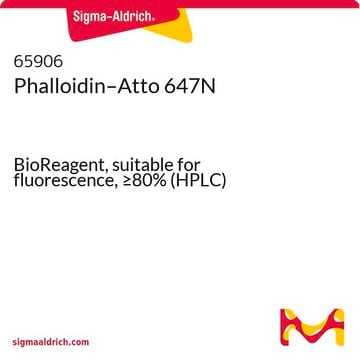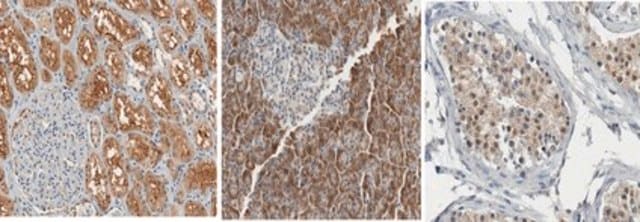OP45
Anti-DCC Mouse mAb (AF5)
Synonyme(s) :
Anti-Deleted Colorectal Carcinoma
Se connecterpour consulter vos tarifs contractuels et ceux de votre entreprise/organisme
About This Item
Produits recommandés
Forme d'anticorps
purified antibody
Niveau de qualité
Clone
AF5, monoclonal
Forme
liquid
Contient
≤0.1% sodium azide as preservative
Espèces réactives
human
Isotype
IgG1
Description générale
Invasive, metastatic colon cancer arises from pre-existing adenomas in both familial and sporadic cases and is characterized by the presence of multiple chromosomal alterations. In the progression from intramucosal carcinoma to invasive carcinoma, allelic loss on the long arm of chromosome 18 is frequently observed. Recently, a gene on 18q21.3 termed DCC, for deleted in colorectal carcinoma, has been isolated and shown to be deleted or mutated in both sporadic and inherited colon carcinoma whereas normal colonic tissue retained and expressed the gene. Furthermore, loss of DCC expression appears to accompany progression of adenomas to metastatic carcinoma. The inactivation of DCC suggests that it is a tumor suppressor gene. A functional role for DCC as a tumor suppressor gene is indicated by experiments demonstrating that introduction of a normal chromosome 18 into the human colon tumor cell lines COKFu or SW480.7 lacking DCC suppresses tumorigenicity. Analysis of the amino acid sequence deduced from cDNA clones indicates that DCC is a transmembrane glycoprotein consisting of 1447 amino acids with an extracellular domain having extensive similarity to neural cell adhesion molecules (NCAM), a single transmembrane segment, and a unique cytoplasmic domain. The high degree of similarity to NCAMs suggests that DCC is involved in cell-cell interactions essential to the differentiated state of the colonic epithelium. DCC expression has been observed in all tissues examined except liver with the highest level of expression in brain tissue. Alterations in DCC expression have also been observed in pancreatic adenocarcinoma and esophogeal carcinoma. However, DCC mRNA is expressed at very low levels, requiring reverse transcription followed by PCR amplification for unambiguous detection.
Purified mouse monoclonal antibody. Recognizes the ~190 kDa DCC protein.
Recognizes the ~190 kDa DCC protein in IMR32 cells.
Immunogène
the extracellular domain of human DCC
Application
Immunoblotting (1-5 μg/ml)
Immunofluorescence (1-5 μg/ml)
Immunoprecipitation (1-2 μg/sample)
Immunofluorescence (1-5 μg/ml)
Immunoprecipitation (1-2 μg/sample)
Forme physique
In 0.05 M sodium phosphate buffer, 0.2% gelatin.
Remarque sur l'analyse
Negative Control
SW480 cells
SW480 cells
Positive Control
IMR32 cells
IMR32 cells
Autres remarques
IMMUNOBLOTTING PROCEDURE
Anti-DCC (Ab-1) can be used to immunoblot proteins previously separated by sodium dodecyl sulfate-polyacrylamide gel electrophoresis and electrophoretically transferred onto nitrocellulose membranes. The proteins a
Certificats d'analyse (COA)
Recherchez un Certificats d'analyse (COA) en saisissant le numéro de lot du produit. Les numéros de lot figurent sur l'étiquette du produit après les mots "Lot" ou "Batch".
Déjà en possession de ce produit ?
Retrouvez la documentation relative aux produits que vous avez récemment achetés dans la Bibliothèque de documents.
M G Dunlop
Seminars in cancer biology, 3(3), 131-140 (1992-06-01)
Due to the accessibility of the intermediate steps in the progression of colorectal cancer and to the existence of heritable susceptibility to the disease, molecular genetic analysis of colorectal carcinogenesis seems likely to answer many of the questions concerning the
M Miyaki et al.
Cancer research, 50(22), 7166-7173 (1990-11-15)
Loss of heterozygosity (LOH) and K-ras mutation were analyzed in 111 colorectal polyps and 26 invasive carcinomas from 40 patients with familial adenomatous polyposis of distinct histopathological types. LOH, being less than 2% in moderate adenomas, was detected on chromosome
R Kikuchi-Yanoshita et al.
Cancer research, 52(13), 3801-3803 (1992-07-01)
We have previously observed that the frequency of loss of heterozygosity (LOH) on chromosome 18q was low in adenomas and intramucosal carcinomas, whereas invasive carcinomas exhibited a high frequency in familial adenomatous polyposis patients (M. Miyaki et al., Cancer Res.
B Vogelstein et al.
Science (New York, N.Y.), 244(4901), 207-211 (1989-04-14)
To examine the extent and variation of allelic loss in a common adult tumor, polymorphic DNA markers were studied from every nonacrocentric autosomal arm in 56 paired colorectal carcinoma and adjacent normal colonic mucosa specimens. This analysis was termed an
A genetic model for colorectal tumorigenesis.
E R Fearon et al.
Cell, 61(5), 759-767 (1990-06-01)
Notre équipe de scientifiques dispose d'une expérience dans tous les secteurs de la recherche, notamment en sciences de la vie, science des matériaux, synthèse chimique, chromatographie, analyse et dans de nombreux autres domaines..
Contacter notre Service technique








